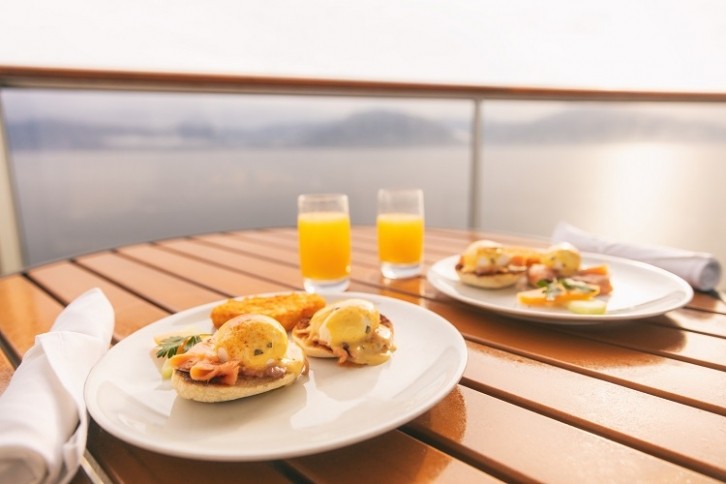The cruise business is just not precisely famed for its eco-friendly credentials. In actual fact, it’s extra more likely to be related to environmentally damaging behaviours, reminiscent of inflicting injury to coral reefs and influencing the migratory patterns of marine wildlife. Nevertheless, the business seems to be bettering its method to the atmosphere, beginning with meals waste.
How is the cruise business lowering meals waste?
There seems to be a concerted effort by the cruise business to enhance its carbon footprint and lowering meals waste is a vital a part of that effort.
A veritable large of the cruise business, Royal Caribbean, has developed a platform to watch meals provide and intently estimate precisely how a lot meals ought to be produced, prepped and ordered on any given day. It is also implementing synthetic intelligence (AI) to regulate meals manufacturing in actual time, monitoring visitor demand for particular menu gadgets and adjusting menu preparation and ordering accordingly, with an intention of lowering meals waste throughout its complete fleet by 50% by 2025. It is also partnering with the World Wildlife Fund (WWF) to introduce a meals waste consciousness marketing campaign within the crew eating areas fleetwide.
However that’s not probably the most fascinating half. Royal Caribbean can also be turning meals waste into vitality. The road’s latest ships will convert stable waste immediately into vitality on board.
“Pioneering the primary waste-to-energy system on a cruise ship builds on our monitor document of waste administration and furthers our dedication to take away waste from native landfills.”
The methods, Microwave-Assisted Pyrolysis (MAP) and Micro Auto Gasification (MAG), takes waste on board and converts it into synthesis gasoline (syngas) that the ship can immediately use as vitality, just like land-based waste-to-energy amenities.
“I’m happy with Royal Caribbean Group’s drive to SEA the Future and be higher tomorrow than we’re in the present day,” mentioned Jason Liberty, president and CEO of Royal Caribbean Group. “Pioneering the primary waste-to-energy system on a cruise ship builds on our monitor document of waste administration and furthers our dedication to take away waste from native landfills.”
And Royal Caribbean is just not the one cruise line placing eco-friendly practices on the agenda. P&O Cruises can also be setting targets for lowering meals waste.
“Due to the concerted dedication of our onboard meals and beverage groups, we proudly achieved and surpassed our 2022 objective to scale back meals waste per particular person by 30%,” a spokesperson for P&O Cruises informed FoodNavigator. “We established a brand new objective of a 40% discount by 2025 and a 50% discount by 2030 relative to our 2019 baseline.”
Like Royal Caribbean, P&O Cruises can also be turning to know-how to responsibly handle the meals waste it does produce, serving to to keep away from a reliance on sending the waste to landfill at ports visited or worse, dumping the waste at sea.
“The secure administration of meals waste is a key element in our ongoing dedication to lowering our impression on the oceans we sail. A method by which we make sure the environment friendly administration of meals waste is thru investments in know-how reminiscent of biodigesters and dehydrators,” a spokesperson for P&O Cruises defined to FoodNavigator.
Meals waste biodigester know-how makes use of a pure cardio digestion course of inside every machine to effectively break down meals waste, utilising a mixture of useful microorganisms. Biodigesters scale back the quantity of methane and carbon dioxide emitted into the ambiance whereas additionally lowering the demand on the ocean for full meals waste decomposition.
Working 24 hours per day, the biodigesters additionally accumulate plastic and different inorganic supplies, stopping them from being discarded overboard. Meals waste dehydrators are then used to take away water content material from the meals waste, lowering its quantity by roughly 90%. Dehydrators produce a principally dry inert biomass output, which is offloaded when the ship reaches port or incinerated on board.
Princess Cruises is one other line to implement using biodigesters of their meals waste.
“Meals is an enormous deal on a ship and we’re focussed on minimising any meals waste,” defined John Padgett, President of Princess Cruises. “We’re accelerating the pure organic course of with this know-how and so any of the biproduct has a decrease impression on the general ecosystem. And we’re measuring ever little bit of it as a result of we weighed it and so now we all know the general waste per visitor on a ship and we’ve got all varieties of initiatives that proceed to give attention to decreasing that waste.”
Can meals producers study from the cruise business about lowering meals waste?
Although they’re arguably late to the sport in the case of eco-conscious behaviours, the cruise business is not solely taking the problem significantly however investing closely in applied sciences to deal with it. And people applied sciences may definitely be utilized by meals producers in coping with meals waste.
The place the cruise business makes use of AI to trace visitor demand for particular menu gadgets and regulate preparations accordingly, meals producers may maybe have a look at shopper demand via gross sales and produce meals merchandise accordingly, thus avoiding overproduction.
Nevertheless, in situations when meals is overproduced, the ensuing waste may probably be transformed again into vitality, utilizing methods just like the Microwave-Assisted Pyrolysis (MAP) and Micro Auto Gasification (MAG) methods utilized by Royal Caribbean. That vitality may then be funnelled again into future meals manufacturing.
Meals producers may additionally use biodigesters and dehydrators to scale back methane and carbon dioxide emissions when disposing of any meals waste produced. In actual fact, some meals and beverage producers are already utilizing the identical or comparable applied sciences, with PepsiCo utilizing biodigesters and sure supermarkets, reminiscent of Hoogvliet within the Netherlands, utilizing AI to watch meals gross sales and drop the worth of meals which might be nearing their expiration date.

